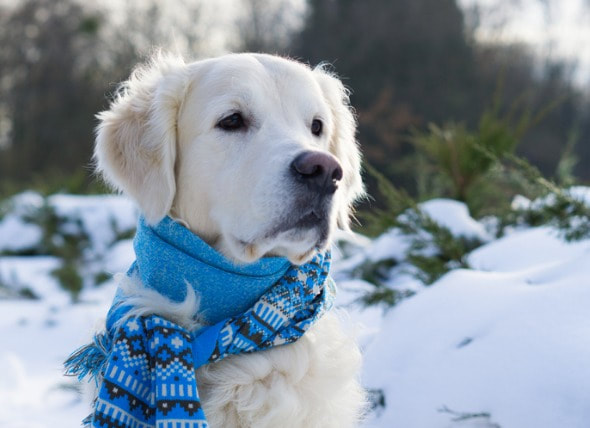Puppy it's COLD outside!We all know that exercise and the mental stimulation being outdoors play are key to keeping our dogs healthy and happy, but what should we do when it’s cold outside? When do the risks of spending time in the cold outweigh the benefits of being outdoors? Let’s take a look at the dangers associated with winter weather and how we can still safely enjoy the great outdoors with our dogs during wintertime.
All Dogs Aren’t Created Equal Dogs are individuals. An outdoor temperature that feels downright balmy to one dog might send another in search of shelter. What are some of the variables that affect how dogs respond to the cold? Coat type – Dogs with thick, double-layered coats tend to be the most cold-tolerant (think Siberian Huskies, Newfoundlands or Samoyeds). In most cases, these breeds have been developed in Northern climates and may also have other anatomical, physiological or behavioral attributes that allow them to thrive when it’s frigid. On the other hand, dogs who have exceptionally thin coats (e.g., Greyhounds and Xoloitzcuintli) suffer the most in cold weather. Coat color – On a clear day, black, brown, or other dark-coated dogs can absorb significant amounts of heat from sunlight, keeping them warmer in comparison to their light-coated brethren. Size – Small dogs have a larger surface area to volume ratio. In other words, the smaller dogs are the more skin they have (in relation to their “insides”) through which to lose heat. Therefore, small dogs get colder more readily than do large dogs … all other things being equal. Weight – Body fat is a good insulator. Thinner dogs tend to get colder quicker than do their heftier counterparts. That said, the health risks of being overweight far outweigh any benefits, so don’t fatten up your dogs during the winter months in a misguided attempt to protect them from the cold. Conditioning – We’ve all experienced this one. Fifty degrees feels quite chilly in October, but after a long, cold winter, a fifty degree day in April can make us break out the shorts and t-shirts. Dogs who are used to cold temperatures handle them much better than do pets who aren’t. Age and Health – The very young, the very old, and the sick are not as able to regulate their body temperatures in comparison to healthy dogs in the prime of their lives, and they therefore need greater protection from the cold. All Temperatures Aren’t Created Equal The temperature as it registers on a thermometer isn’t the only environmental factor that affects how dogs feel the cold. Wind chill – A brisk breeze can quickly cut through a dog’s coat and greatly decreases its ability to insulate and protect against cold temperatures. Dampness – Rain, wet snow, heavy fog, going for a swim … any form of dampness that soaks through the fur can quickly chill a dog even if the air temperature is not all that cold. Cloud cover – Cloudy days tend to feel colder than do sunny days since dogs can’t soak up the sun and warm themselves. Activity – If dogs are going to be very active while outside, they may generate enough extra body heat to keep them comfortable even if the temperature is quite low. Cold Temperature Guidelines for Dogs In general, cold temperatures should not become a problem for most dogs until they fall below 45° F, at which point some cold-averse dogs might begin to feel uncomfortable. When temperatures fall below 32° F, owners of small breed dogs, dogs with thin coats, and/or very young, old or sick dogs should pay close attention to their pet’s well-being. Once temperatures drop under 20° F, all owners need to be aware that their dogs could potentially develop cold-associated health problems like hypothermia and frostbite. The best way to monitor dogs when it’s cold is to keep a close eye on their behavior. If you notice your dog shivering, acting anxious, whining, slowing down, searching out warm locations or holding up one or more paws, it’s time to head inside.
1 Comment
5/31/2023 03:16:37 am
This is a very helpful blog. Also this is very important to all puppies out there.
Reply
Leave a Reply. |
Our creative team at the Animal Hospital of River Oaks take pride in providing educational information as well as keeping our River Oaks's Families well informed in up-coming events happening at the hospital! Archives
June 2020
Categorieshttps://api.pethealthnetworkpro.com/v1/practices/9b0cebb5-40b2-8d36-d4c2-60de940a795b/survey-responses
|
|
Our Practice:
Animal Hospital of River Oaks 161 Old Upper Middle Rd Oakville, ON L6H 1M2 P: 905-338-6257 905-338-0267 [email protected] Follow us on: FACEBOOK - we have a lot of fun pictures and videos, so please click below on the "f" for a link to our facebook page, and enjoy! Site powered by Weebly. Managed by IDEXX Laboratories
|


